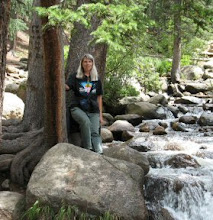Here in Denver, we once had an active CCC alumni group. When I first met them in the mid-1990s, 150 or so of them (CCC men and their spouses) would show up at camp for a monthly meeting during the summer. Yesterday, eight, just eight, of them came to our event; they didn't want to miss it. We were delighted to see them! The photo below shows six. The youngest on the left (Lee is 86 this year), Thelma, Elvy, Henry, Al, and Jack (97).

Behind them, in our display on the wall, is their hero: Franklin Delano Roosevelt. Twenty-seven days after his inauguration as President, he signed a bill creating the Civilian Conservation Corps. Within 90 days, 275,000 young men (ages 18-25) were at work in 1,300 camps around the nation. It took four federal departments (Labor, Army, Interior, and Agriculture) to pull this off, and they did it because the need was critical. The boys and men who enrolled in the CCC in 1933 had been wandering the streets of America's cities and towns, hungry and looking for work that didn't exist. Yes, it was a relief program. The catch was that the men had to work for it. In those days, many people were too proud to take a handout.
Try to imagine 25% unemployment. Here's the story Lee told: "I was seven years old when the stock market crashed [1929], and joined the Cs in 1940 as soon as I was old enough. From the day I enrolled to the time I left was the only time in my life I never had to worry." The government provided housing, food, medical care—and work, lots and lots of good hard work. For some of them, it was the first time they'd had a square meal as well. As Lee added about times before the Cs, "We never missed a meal: we just postponed 'em a while."
The men of the CCC learned a great deal in the Cs. They learned to get along with others, regardless of differences in culture; they learned to respect those in authority and to do their share; and they somehow absorbed a huge sense of commitment, patriotism, and honor that seems to be little understood in our later days of instant gratification and self-absorption. They looked after themselves and each other and handled discipline. Bullies and slackers (called "goldbricks") soon learned to mend their ways. And they changed the face of this country: improving or planting forests and revegetating grasslands; building dams, bridges, roads, and park facilities. A force for land, soil, and water conservation—three million strong—whose works remain today. We use them and travel them without even thinking about the men who built them three-quarters of a century ago. There's a CCC project somewhere near you; check it out this summer and help celebrate the 75th anniversary and the legacy they gave us.
And they changed the face of this country: improving or planting forests and revegetating grasslands; building dams, bridges, roads, and park facilities. A force for land, soil, and water conservation—three million strong—whose works remain today. We use them and travel them without even thinking about the men who built them three-quarters of a century ago. There's a CCC project somewhere near you; check it out this summer and help celebrate the 75th anniversary and the legacy they gave us.
Pearl Harbor signaled the end of the great CCC experiment. Almost to a man, they enlisted and brought their skills to military service. The work ethic and discipline instilled during their service ultimately helped us win World War II.
But the personal growth each enrollee experienced lasted beyond the war and shaped the rest of his life. They married (most for life), and raised families. They believe that the experience of service in the CCC changed their lives, and they believe our country's youth deserve the same opportunity today. If you can find one of these "forgotten men," stop and say thanks.
